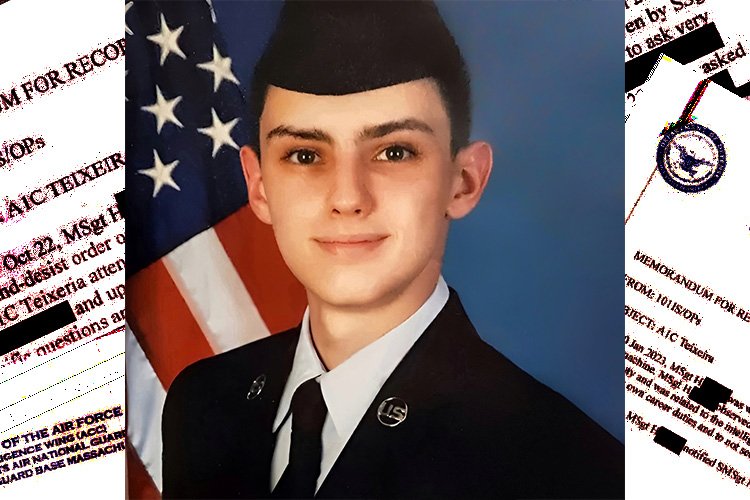Court documents filed by Federal prosecutors this week revealed that Air Force superiors had received multiple warnings regarding the mishandling of classified information by Air National Guardsman Jack Teixeira, the 21-year-old accused of leaking top-secret Pentagon documents online, before his arrest in April.
The documents shed light on several instances in which senior non-commissioned officers caught Teixeira acting suspiciously and potentially posing a counterintelligence threat.
In each instance, Air Force superiors admonished Teixeira for his handling of classified information. However, he was able to continue having access to highly sensitive materials.
Prosecutors also shared copies of comments allegedly made by Teixeira to his friends on Discords, bragging about defying orders related to the sharing of classified information.
“‘Breaking a ton of UD regs’ (a reference to ‘unauthorized disclosure,” Teixeira reportedly wrote on December 6, 2022. “Idgaf [I don’t give a fuck] what they say I can or can’t share,” Teixeira added.
Prosecutors argue Teixeira’s behavior demonstrates a “willful disregard” for the law and justifies his continued custody.
Teixeira, an Airman 1st class with the 102nd Intelligence Wing at Otis Air National Guard Base in Massachusetts, joined the service in 2019 as a cyber transport systems journeyman, responsible for global military communications systems.
The court filings included three Air Force memorandums documenting Teixeira’s mishandling of classified materials and suspicious behavior.
The first memorandum, dated September 15, 2022, reported an incident where Teixeira was observed taking notes on classified intelligence, placing the information into his pocket, and violating security protocols.
An unnamed Air Force Staff Sergeant informed another Master Sergeant about the incident, indicating they had asked Teixeira if he planned to shred the handwritten notes.
The memo states that a Senior Master Sergeant and Master Sergeant discussed the incident with Teixeira, explicitly instructing him to refrain from taking notes on classified intelligence information.
In October, another memorandum highlighted that Teixeira was potentially ignoring a cease-and-desist order on “deep diving into intelligence.”
The memo says that superiors had expressed concern about “very specific” questions asked by Teixeira during an October 20 intelligence support staff meeting and combat intelligence brief.
The court filing says Teixeira was told to “focus on his job” and reminded to follow the previous order on not accessing classified information. He was also evidently offered an opportunity to train for a different intelligence career field, which he declined.
A third memo dated February 4, 2023, reveals that on January 30, a Master Sergeant “walking the Ops floor” caught Teixeira using the Joint Worldwide Intelligence Communications System (JWICS) network to view “content that was not related to his primary duty and was related to the intelligence field.”
As in the previous incidents, the memo states Teixeira was told to focus on his career duties and not seek out intelligence products.
In light of the repeated concerns over his mishandling of classified information, Teixeira not only retained his Top-Secret security clearance but also received two certificates for completing security training on preventing the unauthorized disclosure of classified information.
In court filings, lawyers from the Department of Justice’s National Security Division cited the security training courses as evidence that Teixeira was “well aware of his obligations” to protect national security information and could not be trusted if he was released from custody pending trial.
Teixeira was arrested on April 13 and now faces federal charges of unauthorized retention, removal, and transmission of national defense information and classified documents.
According to the Justice Department’s affidavit, Teixeira held a Top-Secret security clearance, with sensitive compartmented access, indicating access to highly classified information.
The leaked documents allegedly contained classified defense information related to operations in the Ukraine war and U.S. surveillance efforts worldwide.
Making their case against Teixeira’s pre-trial release, prosecutors argued that Teixeira has a history of using “any opening to his advantage and has proven himself to be adept at offering false deflections of his prior conduct and evading restrictions placed on him.”
Attorneys also cited a video published by The Washington Post showing Teixeira using racial and ethnic slurs and shooting a semi-automatic rifle at an unseen target.
“Jews scam, n—-rs rape, and I mag dump,” Teixeira says in the video before firing 10 rounds from an SKS rifle. Prosecutors clarified that the term “mag dump” refers to continuously firing at a target until the weapon is out of ammunition.
“He did call himself racist, multiple times,” a friend of Teixeira told the Washington Post. “I would say he was proud of it.”
Federal prosecutors say Teixeira’s history of racism, fascination with mass shootings, belief in seditious conspiracy theories, and willful disregard for the law contradict the “self-serving narrative [he] has advanced of his own character and morality.”
Teixeira’s legal team has argued that he poses no security risk and is seeking his release on $20,000 bail.
What is not clear from court filings is why so many red flags were apparently ignored, and Teixeira was allowed to retain a Top Secret security clearance after being caught on multiple occasions mishandling classified information.
“It’s a CI [counterintelligence] nightmare,” a Department of Defense counterintelligence official told The Debrief. “There were multiple failures here, and I imagine some people’s careers are going to end over this one.”
Aside from the behavior outlined in the three DoD memos, speaking under a condition of anonymity, the counterintelligence official said that commanders at the 102nd Intelligence Wing must have ignored other indications that Teixeira was mishandling classified information.
“Without getting into specifics, they should have known every time he logged into SIPRNet or JWICS, what he was accessing, and that he was printing off and retaining classified documents,” the official said.
“It’s just a CI nightmare,” they reiterated.
Following Teixeira’s arrest, spokesman for Air Force Secretary Frank Kendall, Frank Hartnett, said the 102nd Intelligence Wing’s intelligence mission had been “paused and divided among other units” while the Air Force investigated the circumstances surrounding the leak.
Airmen with the 102nd Intelligence Wing will “continue to train and complete other administrative tasks and duties that are not specifically related to their primary mission,” an Air Force official told Military.com.
Two of Teixeira’s superiors have been suspended pending the completion of an investigation by the Air Force inspector general, according to Air Force spokeswoman Ann Stefanek.
Teixeira’s detention hearing is scheduled for Friday, May 19, in Massachusetts.
In his initial court appearance, Teixeira was told by the judge that he could face a prison sentence of up to 15 years for the unauthorized retention and transmission of national defense information and unauthorized removal and retention of classified materials.
Tim McMillan is a retired law enforcement executive, investigative reporter and co-founder of The Debrief. His writing typically focuses on defense, national security, the Intelligence Community and topics related to psychology. You can follow Tim on Twitter: @LtTimMcMillan. Tim can be reached by email: tim@thedebrief.org or through encrypted email: LtTimMcMillan@protonmail.com

